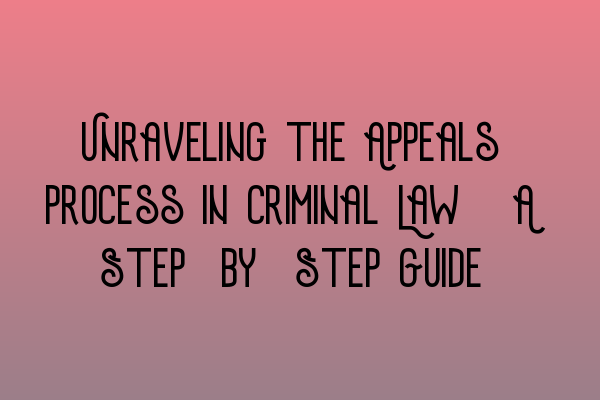Unraveling the Appeals Process in Criminal Law: A Step-by-Step Guide
Appeals play a fundamental role in the criminal justice system, providing individuals with the opportunity to challenge their conviction or sentence. Understanding the appeals process is crucial for anyone facing criminal charges or working in criminal law. In this comprehensive guide, we will walk you through each step of the appeals process, giving you a clear understanding of how it works and what you can expect.
Step 1: Grounds for Appeal
The first step in the appeals process is to establish valid grounds for appeal. Common grounds may include legal errors, new evidence, or misconduct during the trial. Familiarize yourself with the SQE 1 Practice Exam Questions to enhance your knowledge of criminal law principles and potential grounds for appeal.
Step 2: Notice of Appeal
Once you have identified grounds for appeal, the next step is to file a Notice of Appeal. This document formally notifies the court that you intend to appeal your conviction or sentence. Ensure that you understand the specific requirements and time limits for filing a Notice of Appeal, as these may vary depending on the jurisdiction.
Step 3: Record Compilation
In preparation for the appeal hearing, it is crucial to compile a complete record of the trial proceedings. This record will typically include transcripts, exhibits, and other relevant documents. Familiarize yourself with the SQE 1 Practice Mocks FLK1 FLK2 to gain practical experience in compiling records and presenting evidence.
Step 4: Grounds of Appeal and Skeleton Arguments
Building on the grounds for appeal identified earlier, it is essential to develop thorough legal arguments to support your case. These arguments, known as skeleton arguments, outline the legal principles and authorities that justify your appeal. Strengthen your legal argumentation skills with our SQE 2 Preparation Courses to enhance your chances of success.
Step 5: Appeal Hearing
The appeal hearing is the stage where arguments are presented before a panel of judges. It is crucial to prepare thoroughly for this stage, as it is your opportunity to persuade the judges to rule in your favor. Practice your oral advocacy skills with our SQE 1 Preparation Courses to gain confidence in presenting your case effectively.
Step 6: The Decision
After considering the arguments presented, the court will reach a decision. The decision may involve upholding the conviction or sentence, granting a retrial, or even overturning the conviction. Stay updated on the SRA SQE Exam Dates to ensure you meet any deadlines for filing further appeals or seeking additional legal remedies.
Appealing a criminal conviction or sentence can be a complex and challenging process. It requires a deep understanding of the law, meticulous preparation, and effective argumentation. At SQE Criminal Law & Practice Law UK, our team of experienced solicitors can provide you with the guidance and support you need throughout the appeals process.
Contact us today to learn more about our services and how we can assist you in unraveling the appeals process.
